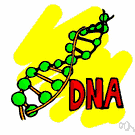cistron
(redirected from cistrons)Also found in: Thesaurus, Medical, Encyclopedia.
cis·tron
(sĭs′trŏn′)n.
A section of DNA that contains the genetic code for a single polypeptide and functions as a hereditary unit.
cis·tron′ic adj.
American Heritage® Dictionary of the English Language, Fifth Edition. Copyright © 2016 by Houghton Mifflin Harcourt Publishing Company. Published by Houghton Mifflin Harcourt Publishing Company. All rights reserved.
cistron
(ˈsɪstrən)n
(Genetics) genetics the section of a chromosome that encodes a single polypeptide chain
[C20: from cis-trans; see cis-trans test]
Collins English Dictionary – Complete and Unabridged, 12th Edition 2014 © HarperCollins Publishers 1991, 1994, 1998, 2000, 2003, 2006, 2007, 2009, 2011, 2014
cis•tron
(ˈsɪs trɒn)n.
a segment of DNA that codes for the formation of a specific protein; a structural gene.
cis•tron′ic, adj.
Random House Kernerman Webster's College Dictionary, © 2010 K Dictionaries Ltd. Copyright 2005, 1997, 1991 by Random House, Inc. All rights reserved.
ThesaurusAntonymsRelated WordsSynonymsLegend:
Switch to new thesaurus
| Noun | 1. |  cistron - (genetics) a segment of DNA that is involved in producing a polypeptide chain; it can include regions preceding and following the coding DNA as well as introns between the exons; it is considered a unit of heredity; "genes were formerly called factors" cistron - (genetics) a segment of DNA that is involved in producing a polypeptide chain; it can include regions preceding and following the coding DNA as well as introns between the exons; it is considered a unit of heredity; "genes were formerly called factors"dominant gene - gene that produces the same phenotype in the organism whether or not its allele identical; "the dominant gene for brown eyes" allele, allelomorph - (genetics) either of a pair (or series) of alternative forms of a gene that can occupy the same locus on a particular chromosome and that control the same character; "some alleles are dominant over others" genetic marker - a specific gene that produces a recognizable trait and can be used in family or population studies homeotic gene - one the genes that are involved in embryologic development lethal gene - any gene that has an effect that causes the death of the organism at any stage of life linkage group, linked genes - any pair of genes that tend to be transmitted together; "the genes of Drosophila fall into four linkage groups" modifier gene, modifier - a gene that modifies the effect produced by another gene mutant gene - a gene that has changed so that the normal transmission and expression of a trait is affected nonallele - genes that are not competitors at the same locus operator gene - a gene that activates the production of messenger RNA by adjacent structural genes oncogene, transforming gene - a gene that disposes normal cells to change into cancerous tumor cells polygene - a gene that by itself has little effect on the phenotype but which can act together with others to produce observable variations proto-oncogene - a normal gene that has the potential to become an oncogene recessive gene - gene that produces its characteristic phenotype only when its allele is identical; "the recessive gene for blue eyes" regulator gene, regulatory gene - a gene that produces a repressor substance that inhibits an operator gene repressor gene - gene that prevents a nonallele from being transcribed structural gene - a gene that controls the production of a specific protein or peptide suppresser gene, suppressor gene, suppresser, suppressor - a gene that suppresses the phenotypic expression of another gene (especially of a mutant gene) transgene - an exogenous gene introduced into the genome of another organism X-linked gene - a gene located on an X chromosome holandric gene, Y-linked gene - a gene located on a Y chromosome chromosome - a threadlike strand of DNA in the cell nucleus that carries the genes in a linear order; "humans have 22 chromosome pairs plus two sex chromosomes" genetic science, genetics - the branch of biology that studies heredity and variation in organisms molecular biology - the branch of biology that studies the structure and activity of macromolecules essential to life (and especially with their genetic role) sequence - serial arrangement in which things follow in logical order or a recurrent pattern; "the sequence of names was alphabetical"; "he invented a technique to determine the sequence of base pairs in DNA" deoxyribonucleic acid, desoxyribonucleic acid, DNA - (biochemistry) a long linear polymer found in the nucleus of a cell and formed from nucleotides and shaped like a double helix; associated with the transmission of genetic information; "DNA is the king of molecules" |
Based on WordNet 3.0, Farlex clipart collection. © 2003-2012 Princeton University, Farlex Inc.
TranslationsSelect a language:
-----------------------